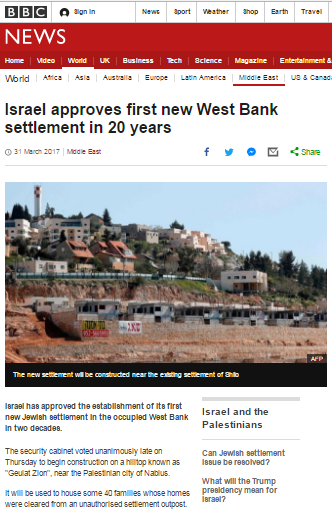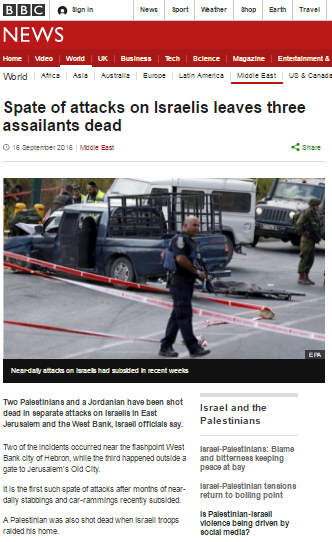The use of imprecise language in BBC reports has frequently steered audiences towards the inaccurate belief that in recent years new communities have been built in Judea & Samaria and the parts of Jerusalem occupied by Jordan between 1948 and 1967. Some of the latest examples of that practice include: [all emphasis added]
“An increase in settlement construction in recent months has led to international criticism of Israel…” Yolande Knell, BBC Radio 4 news bulletin, December 24th 2016.
“Pro-Palestinian groups criticised the deal, saying it rewards Israel despite the ongoing construction of Jewish settlements in the occupied West Bank. […]
Last month, the White House warned that the construction of settlements posed a “serious and growing threat to the viability of a two-state solution” to the Israeli-Palestinian conflict.” BBC News website, September 13th 2016 (later amended following a complaint from BBC Watch)
“But the outgoing Obama administration has long made clear its opposition to Israeli settlement-building in occupied territory…” BBC News website, December 23rd 2016.
“This is a vote on a resolution that condemns the building of Israeli settlements on occupied Palestinian territory. It says it’s illegal under international law. […]
“They themselves [the US administration] have been very critical of settlement building over the last year.” BBC News website, December 23rd, 2016.
“The resolution reflects an international consensus that the growth of Israeli settlement-building has come to threaten the viability of a Palestinian state in any future peace deal.” BBC News website, December 23rd and 24th, 2016.
“The US president-elect Donald Trump has called for a UN Security Council resolution aimed at halting the building of Israeli settlements to be vetoed.”
“…this particular Israeli government has…has done a lot of settlement building and it is…it’s very much its policy.” BBC World Service radio, December 22nd 2016.
“I think Britain is concerned about the number of settlements that he’s [Netanyahu] authorised in the occupied Palestinian territories…” Jeremy Bowen, BBC Radio 5 live, February 6th 2017.
As has been noted here on numerous occasions, the employment of such lax terminology obviously leads BBC audiences to mistakenly believe that Israel has been constructing new communities rather than – as is actually the case – building homes in existing towns and villages, most of which would under any reasonable scenario remain under Israeli control in the event of an agreement. Concurrently, the BBC has not bothered to inform its audiences that the existing agreements between Israel and the Palestinians – the Oslo Accords – place no limitations whatsoever on construction in Area C or Jerusalem.
In early February the BBC News website reported that:
“…Israel’s prime minister has announced that he plans to establish a new settlement in the West Bank for the first time in more than two decades.” [emphasis added]
Visitors to the BBC News website on March 31st found a report headlined “Israel approves first new West Bank settlement in 20 years” which includes a recycled map sourced from the political NGO B’Tselem as well as statements from the political NGO ‘Peace Now’ and a link to its website. BBC audiences were not informed that the plan to build a new community is dependent upon approval from the full cabinet.
“Israel has approved the establishment of its first new Jewish settlement in the occupied West Bank in two decades. […]
While Israel has continued to expand settlements and has retroactively approved outposts constructed without permits, this is the first time it has agreed a new settlement since the 1990s, reports the BBC’s Yolande Knell in Jerusalem.” [emphasis added]
Listeners to BBC Radio 4’s ‘Today’ programme on March 31st heard Sarah Montague discussing the same story with Yolande Knell (from 2:56:26 here).
Montague: “Israel’s security cabinet has approved the construction of the first new settlement in the occupied West Bank for two decades.”
Knell: “….it’s something of real symbolic importance. Israel hasn’t built a new settlement since the 1990s. Instead, the construction that we hear a lot about has been focused on building within existing settlements…”
Clearly then the BBC understands that there is a significant difference between the construction of houses within the municipal boundaries of existing communities and the establishment of a “new settlement”. The question that therefore arises is why – given its supposedly rigorous standards of accuracy – for so many years its journalists regularly employed imprecise language that materially misled audiences on the topic of Israeli construction.
While we do not anticipate any public accountability on that issue, we will be closely monitoring the language used in future BBC reporting relating to construction.
Another notable aspect of the March 31st written report comes in this paragraph:
“It [ the Israeli security cabinet] also approved tenders to build 1,992 new homes at four other existing settlements, and declared almost 100 hectares (247 acres) as “public land” in order to enable the retroactive legalisation of three outposts, according to Peace Now.”
Readers are not told that those “1,992 new homes” were already reported by the BBC when they were first announced in January. As has been noted here on previous occasions, BBC audiences often receive misleading impressions regarding the scale of construction in Judea & Samaria and parts of Jerusalem because – rather than reporting actual building – the BBC covers announcements of building plans, planning approvals and issues of tenders, regardless of whether they actually come to fruition.
Related Articles:
Continuing documentation of the BBC’s B’Tselem map binge
How the BBC invents ‘new settlements’ with lax language
Quantifying BBC ‘due impartiality’ on ‘international law’




